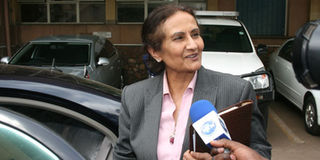Rules to guide judge’s sessions with witnesses

PETERSON GITHAIGA | NATION. Lady Justice Kalpana Rawal leaves the Attorney-General Amos Wako's office at Nairobi's Sheria House October 18, 2010. The procedure to be followed in taking witness statements for The Hague is in place, after draft rules were discussed at a meeting between Lady Justice Kalpana Rawal, chief public prosecutor Keriako Tobiko and lawyers representing post-election violence suspects.
The procedure to be followed in taking witness statements for The Hague is in place.
The draft rules, which were discussed at a meeting between Lady Justice Kalpana Rawal, chief public prosecutor Keriako Tobiko and lawyers representing post-election violence suspects will be given to a Cabinet sub-committee Tuesday morning.
The sub-committee will peruse the rules and if need be amend them before they are gazetted.
Sources at the meeting, which was held at the State Law offices in Sheria House, told the Nation that the rules concern procedure.
They relate to how witnesses should be called and what notices should be given to them, among other issues.
The lawyers who attended the meeting are Mr Evans Monari, Mr Gershom Otachi Bw’Omanwa and Kenneth Ogeto.
Under the International Crimes Act, reluctant witnesses are required to record statements before a judge.
Lady Justice Rawal was appointed by Chief Justice Evan Gicheru to record the statements. The judge is then expected to certify the evidence and forward it to the Attorney-General.
The Kenya National Commission on Human Rights is happy with the progress made by the International Criminal Court in investigating the 2007 post-election chaos.
Commissioner Hassan Omar said that despite opposition from some government quarters “we are optimistic the ICC will be able to conclude as per its deadline.”
“Sooner or later, the cases will be going to the pre-trial chamber,” he said.
Mr Omar said warned that some government officials refusing to respond to questions from the ICC investigators does not mean that they could not be presented as suspects or witnesses.




